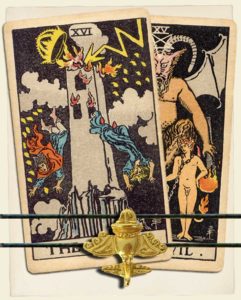What I said to Jamie on Tuesday has got me thinking a bit.
At the end of Who We Are, William Pierce said that history has tremendous inertia: a phrase that made a big impression on the way I see the world. It is a phrase that should resonate with those who want to save the white race from extinction because it has great explanatory power for what is happening.
The present subtitle of this site says that the enemy to be identified is Christianity. But I actually mean the morality bequeathed to us by Christianity, which has reached truly psychotic levels of metastasis in the secular—and supposedly anti-Christian!—West with the Woke fad.
Ever since various Roman emperors introduced ‘spiritual terror’ into the Aryan psyche (Hitler’s phrase in one of his after-dinner talks during WW2), through parental introjects whites have been transmitting this malware to their progeny. This happened until, in the last century, Uncle Adolf tried to transvalue values. That’s why euthanising millions of retards, deporting the subversive tribe out of Germany, or even genocide of non-Aryans began to take place, in the first half of the 1940s, in Poland and the Soviet Union.
The inertia is apparent when we see that on this side of the Atlantic Pierce suggested the same thing but only at the novel level, in The Turner Diaries (published as a serial from 1975 to 1978). Dates are important here. In Who We Are (published as a serial from 1978 to 1982), which is non-fiction, we do see isolated phrases about the need for expulsion and extermination, but not as frankly and directly as the SS Master Plan East.
In the early 1940s, there was already, at least in Europe’s most powerful country, an effective transvaluation of all Christian values. After the catastrophic defeat and the triumph of the forces of Evil, a mind as extraordinarily lucid as Pierce’s had to speak in novel form, or say things between the lines if he spoke in a non-fiction format. But then historical inertia pulled the Aryan’s collective unconscious, once again, back into Christian morality! Today’s nationalists ‘know’ that genocide is iniquitous, especially if practised for racial or eugenic reasons. This is evident even in the mainstream forums of contemporary white nationalism, where it would be inconceivable to promote exterminationism even between the lines as Pierce did, let alone the overt exterminationism of the Nazis’ Master Plan East.
 The historical backlash has been such that, in reaction to the Third Reich, the entire West has been regressing to a kind of 13th and 14th-century neo-Franciscanism (see my discussion of St Francis on pages 132-137 of Daybreak). In my previous posts, I talked about the relevance of studying cases of mental disorders of a specific subject, and in the comments section I linked videos of psychologists talking about how certain types of disturbed subjects suffer a regression in which they sometimes look like toddlers. We can already imagine the same phenomenon but on the scale of an entire civilisation (Western civilisation). And I don’t say at the level of an entire race because Latin Americans, who aren’t white, are also suffering from Wokism. This radically secularised phase of Christian values only affects nations that wholeheartedly embraced Catholicism and Protestantism.
The historical backlash has been such that, in reaction to the Third Reich, the entire West has been regressing to a kind of 13th and 14th-century neo-Franciscanism (see my discussion of St Francis on pages 132-137 of Daybreak). In my previous posts, I talked about the relevance of studying cases of mental disorders of a specific subject, and in the comments section I linked videos of psychologists talking about how certain types of disturbed subjects suffer a regression in which they sometimes look like toddlers. We can already imagine the same phenomenon but on the scale of an entire civilisation (Western civilisation). And I don’t say at the level of an entire race because Latin Americans, who aren’t white, are also suffering from Wokism. This radically secularised phase of Christian values only affects nations that wholeheartedly embraced Catholicism and Protestantism.
I see no open rebellion against this inertia anywhere, whose pendulum has now reached its psychotic phase. I see no transvaluation even in the forums of the racial right. On the contrary: unlike the hardcore Nazis and Pierce, there is a clear attempt to distance oneself from any idea of eliminating the enemy by ethnic cleansing. The inexorable force in this era is the backlash due to the values bequeathed by the New Testament, as Tom Holland has seen in Dominion and his lectures and interviews. (Holland himself is infected with these inverted values, but his axiological analysis of the West is spot on.)






